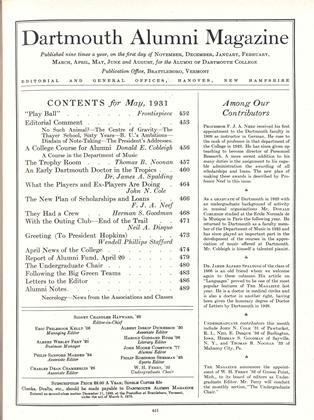The usual variety of excellent lecturers has been in Hanover the past month. Perhaps the high spot was provided by A. J. Villiers in an evening devoted to an expose of the clipper-ship menace, a lecture which was well-illustrated with pictures made while he was aboard his ship. Two showings were necessary to accommodate the crowd which gathered to hear him. Bradford Washburn, a sophomore at Harvard, came the night after under the auspices of the Outing Club to tell of his mountain-climbing career. Senator Moses and Representative Luce of Massachusetts were the speakers on the Guernsey Moore Center Foundation for this year.
The Dartmouth has been riding along easily on the top of its gently critical wave. First we think that we must do something about the equivocal attitude which it takes for a while—and just as we are getting up in arms about that, we are smitten in the eye with an editorial which causes us to subside a bit. We think that it is right on the verge of launching an educational program—and if it doesn't, it should. Meiklejohn and the rest of his class aren't officially approved— we shall undoubtedly soon know what side we are on. It's a trifle disconcerting to be on both sides at once, that is. Its variegated editorality (don't look it up) has brought many good points to the public eye, however. Perhaps the best of these is the survey into the results of the reading period. After quoting a concise table of statistics "gleaned from the administrative offices" the conclusion is reached that "... the reading period has benefitted the majority of the college. The minority upon whom its effect was nil is made up of those who took advantage of the freedom and sped to points south and southeast. The arguments in its favour, then, are just this: there seems to be some slight increase in high averages; there was probably a greater amount of comprehensively synthesizing courses; and finally, there very definitely was a more sophisticated and mature attitude about the cut-and-dried examination period."
In addition to this, Webster Hall, the ballot-box outrage, the Nugget, and sundry other things of campus interest were conclusively covered, an inverted aphorism and a rather cockeyed advertisement climaxing the period. They follow: "Sweet are the uses of anonymity" and "Lost—bass drum: please apply Palaeopitus." We think that there is only one more thing to add— L'Oiseau, a new funny-column has been appearing irregularly—and we see in it a well-hidden plan to drive Jacko from the humorous supremacy which we sometimes wonder if it enjoys.
 View Full Issue
View Full Issue
More From This Issue
-
 Class Notes
Class NotesCLASS OF 1930
May 1931 By Albert I. Dickerson -
 Class Notes
Class NotesCLASS OF 1910
May 1931 By "Hap" Hinman -
 Lettter from the Editor
Lettter from the EditorEditorial Comment
May 1931 -
 Article
Article(A Centennial Memorial)
May 1931 By Dr. James A. Spalding '66 -
 Class Notes
Class NotesCLASS OF 1929
May 1931 By Frederick W. Andres -
 Class Notes
Class NotesCLASS OF 1924
May 1931 By C. Jerry Spaulding
Wilbur H. Ferry '32
-
 Article
ArticleThe Undergraduate Chair
MAY 1931 By Wilbur H. Ferry '32 -
 Article
ArticleCLASS ELECTIONS
MAY 1931 By Wilbur H. Ferry '32 -
 Article
ArticleMUSICAL CLUBS
MAY 1931 By Wilbur H. Ferry '32 -
 Article
ArticleCONCERT SERIES
MAY 1931 By Wilbur H. Ferry '32 -
 Article
ArticleDEBATERS
MAY 1931 By Wilbur H. Ferry '32 -
 Article
ArticleMILESTONES
MAY 1931 By Wilbur H. Ferry '32
Article
-
 Article
ArticleTHE TAPPAN WENTWORTH AND OTHER GENERAL FUNDS OF THE COLLEGE*
FEBRUARY, 1908 -
 Article
ArticleGreen Derby
March 1950 -
 Article
ArticleNew Fund Secretary
October 1951 -
 Article
ArticleCoaches' Corner
JANUARY 1959 -
 Article
ArticleGolf
June 1957 By Cliff Jordan '45 -
 Article
ArticleConfessions of a pro circuit skier
APRIL • 1985 By John Kennedy '84

